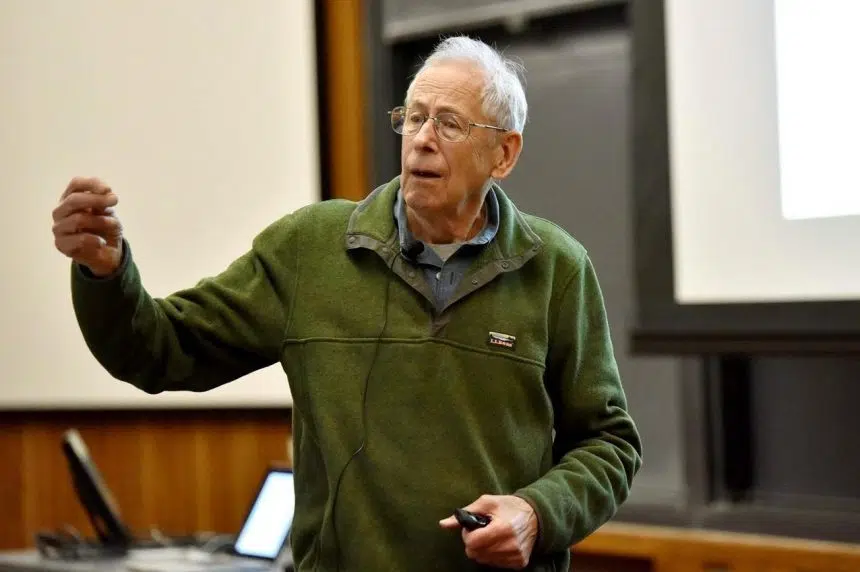James Peebles, a Manitoba-born scientist who won the Nobel Prize for physics on Tuesday, said his relatively quiet life isn’t so quiet anymore.
Peebles, who was born in the Francophone community of St. Boniface before it became part of Winnipeg, completed his undergraduate studies at the University of Manitoba before moving to Princeton University in New Jersey for graduate school.
A dual Canadian-American citizen, he has taught at the Ivy League school for the past five decades.
The 84-year-old has been retired for 20 years but continues to research and teach at a “relaxed rate” because he enjoys it, he said in a phone interview in between media events.
“Life will go on,” he said. “I suppose the aura of the Nobel is such that my life will change, but I don’t think I’m going to let it change much.
“You understand, I’m used to a quiet life.”
The Nobel committee said it gave Peebles the honour because his work is the basis of our contemporary ideas about the universe from the big bang to the present day.
“The field has exploded,” Peebles said. “It’s just a remarkable extension of well-tested natural science. A remarkable extension, so it should be recognized. And I’ve been working on it longer than anyone.”
He also told news conferences Friday that while awards are “very much appreciated,” that’s not why young people should study science.
“You should enter it for the love of the science,” he said. “You should enter science because you are fascinated by it. That’s what I did.”
Peebles said part of his childhood in Manitoba was spent building or taking things apart, like the clocks in his family’s home.
“One of my earliest memories is throwing a tantrum because I wasn’t allowed to put together the coffee percolator,” he said.
“I simply liked looking at the world around us.”
Neil Turok, who worked with Peebles at Princeton and now serves as director of the Centre for the Universe at the Perimeter Institute in Waterloo, Ont., described his former colleague as an unsung hero, famous in the world of cosmology but seldom recognized outside of it.
“Normally I would congratulate somebody for winning the Nobel Prize — and of course I do in this case. But today I’d like even more to congratulate the Nobel Prize,” Turok said. “Jim is one of the most modest people in the field. His contributions are frequently overlooked. The experts know you can’t oversee him.”
Turok said Peebles founded the subject of physical cosmology, laying out the chemical makeup of the universe at its beginning and later explaining the way that galaxies are formed.
Peebles has honorary doctorates from a string of Canadian universities and is a fellow of the Royal Society of Canada and the Order of Manitoba.
He is also the author or co-author of five books, including “Physical Cosmology” and “Finding the Big Bang.” He said he has a sixth book coming out next year, which maps the history of cosmology, from Albert Einstein to today.
Peebles shares the Nobel Prize with Swiss scientists Michel Mayor and Didier Queloz, who won for the discovery of an exoplanet orbiting a solar-type star. Mayor and Queloz announced their discovery of the planet, known as 51 Pegasi B, 24 years ago.
The three men will share a nine-million kronor (C$1.2 million) cash award, a gold medal and a diploma. The laureates receive them at a ceremony in Stockholm on Dec. 10.
Peebles said he plans to give some of his winnings to charity and his family. “I owe a lot to the University of Manitoba and a chunk will go to it,” he added.
David Barnard, president of the University of Manitoba, said Peebles’ achievements have inspired new generations of scientists.
“We are really proud of him here in Winnipeg,” said Mayor Brian Bowman.
Peebles is the second Canadian in a row to win the physics prize. The University of Waterloo’s Donna Strickland picked up the honour in 2018.
Arthur McDonald, a retired professor at Queen’s University, won the prize in 2015.
— With files from The Associated Press and Kelly Geraldine Malone in Winnipeg
Nicole Thompson, The Canadian Press







